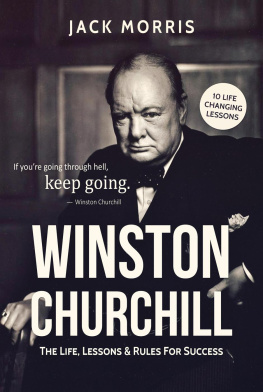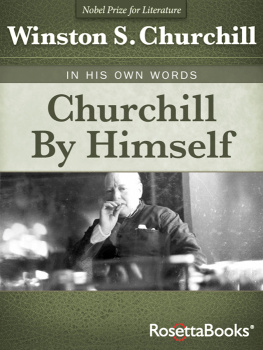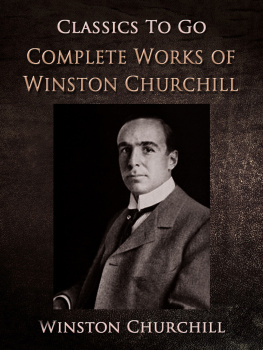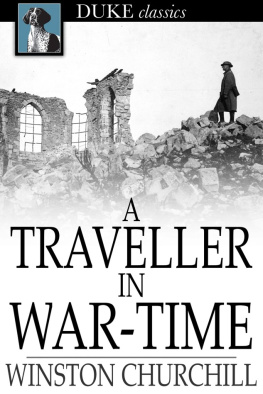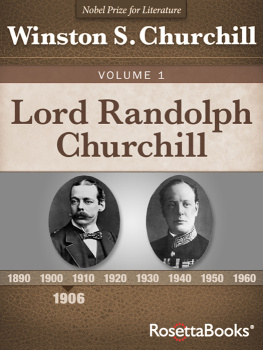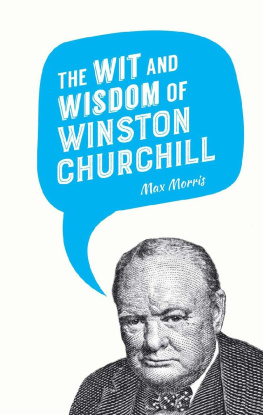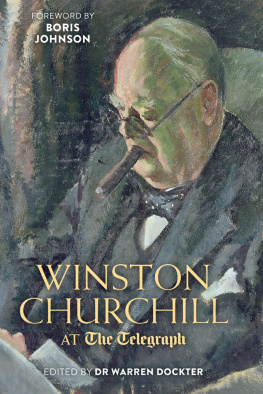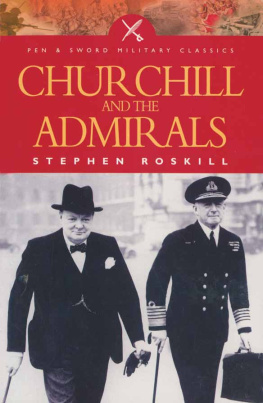Winston Churchill
The Life, Lessons & Rules For Success
Jack Morris
Table of Contents
Copyright 2016 JACK MORRIS
.
All rights reserved. No part of this book may be reproduced or transmitted in any form or by any means, electronic or mechanical, including photocopying, recording or by any information storage and retrieval system without written permission of the publisher, except for the inclusion of brief quotations in a review.
F rom schoolboy failure to wartime hero, Winston Churchill had an astonishing life ensuring his place in history. It is no secret Churchill had a passion for war, as a young officer he served in British India, the Anglo Sudan War and the Second Boer War. From being captured as a prisoner of war whilst in Africa, he escaped to safety becoming a minor national hero in the process. From relative failure through his role in World War I to commanding Great Britain out of their darkest hour and eventually onto victory during World War II, there can be no doubt of the tenacity shown by the man during what can only be described as an extremely eventful and interesting life.
On the frontline of politics for more than 50 years, Churchill held a variety of political and cabinet positions. Serving as Prime Minister on two separate occasions, his radio broadcasts and speeches were instrumental in inspiring the British Resistance during the difficult times of 1940-41 when the British Empire stood almost alone in resisting Hitlers Nazi Germany. It is quite easy to see why in a 2002 poll; Sir Winston Leonard Spencer-Churchill was named the Greatest Briton of all time.
Chapter 1: Family and Early Life
A s an adult, he collected all kinds of titles from the military, from the government, and from his grateful countrymen but as a child, he was just Winston Leonard, born on November 30, 1874, the first son of Lord Randolph Churchill and Jeanette Jennie Jerome. He was born in a suite of rooms contained within the heart of Blenheim Palace, the great country house and principal residence of the Dukes of Marlborough.
Wealth, power, and privilege surrounded Winston practically from the moment that he was born. His father, Lord Randolph, was the third-born son of the 7th Duke of Marlborough, who by the time of his first sons birth had become a by-name in British politics through his promotion of the ideals of progressive Conservatism. He felt that the Tories should support and promulgate popular reforms instead of opposing them, and he used his charisma and his talent for making speeches to promote that agenda throughout his political career.
Although Lord Randolph was not on the track to inherit his familys noble titles, he could still partake of the immense prestige and respect accorded them. It could be said that he belonged to a high-born family indeed; well before Winston was born, the Dukes of Marlborough whose very line had begun with John Churchill, one of the first generals of the British Army had married into the equally noble and esteemed Spencer family, meaning that their descendants could take the formidable double-barreled surname of Spencer-Churchill. However, for simplicitys sake, Lord Randolph, and his sons after him, were all referred to by the last name of Churchill throughout their lives.
His mother, Jennie, was similarly born with a silver spoon in her mouth. She was the eldest daughter of the New York stock-market speculator, yachtsman, horse-race aficionado, and financier Leonard Jerome. In the eyes of American society at that time, that placed her on an equal footing with the hereditary noble families of Europe. The familys immense wealth allowed her and her sisters to become well-known socialites on the other side of the Atlantic Ocean. She had been introduced to Lord Randolph Churchill by no less than the future king Edward VII, and was well-known for her wit and beauty.
Winston spent part of his childhood in Dublin; at the time, his paternal grandfather, the 7th Duke of Marlborough, was serving as the Viceroy of Ireland, and had taken his son (Winstons father) on as his private secretary. Some historians and biographers have since claimed that Winstons interest in military matters may have had its roots in the many parades and ceremonies that would take place around the Viceroys residence.
It was the common practice among the middle and upper classes at the time for the parents to have little to no hand in their childrens upbringing, and Winstons parents did not see fit to deviate from that practice. In Dublin, it was a governess, not his parents, who taught him the traditional three Rs (reading, writing, and rithmetic). His emotions and childhood interests, too, were spent with someone who wasnt connected to the family by blood ties: his nanny, Elizabeth Ann Everest. She became a permanent presence in young Winstons life practically from the cradle, and in return he regarded her as a substitute for his emotionally distant mother. She was his caretaker and confidant, and he addressed her by the affectionate title of Woom, or Woomany.
Winstons younger brother, John, was born during the familys sojourn in Dublin. He seemed to have been a loving and good-natured younger brother, who did better than Winston ever did at school. Lord Randolph and, on occasion, Jennie, would write letters to Winston in which they pleaded with him to apply himself to his schoolwork as his brother did.
Winston chose to be ruled by his independent and rebellious nature through his school years. Though he was possessed of an innate talent and a keen interest in both mathematics and history, he was not interested in studying the classics, making his teachers at St. Georges, Brunswick, and Harrow despair of him. And he seemed to feel the same way about them: particularly when he was at Harrow, he would write long letters to his mother, begging her to allow him to leave school and go home, or at the very least to come and visit him. Her silence in that regard may have contributed to his sense of being left adrift, and may have contributed to the fact that he remained at the bottom of the class throughout his school years.
One of the few bright spots in that period of Winstons life was his stint in the Harrow Rifle Corps. This program still exists today, under the aegis of the Combined Cadet Force. In Winstons time, the members of the corps, or cadets, were taught drills and marksmanship, and then as now were encouraged to consider going on to become officers in the armed forces.
During the school holidays, Winston would rejoin his parents and brother either at home or at the various estates of other family members and close friends. On one such occasion when he was 18, that estate, belonging to his aunt Lady Wimborne, was located in Bournemouth. Later on in life, he described it as forty to fifty acres of forest that abruptly terminated in cliffs overlooking the English Channel. Rustic bridges crossed the many cracks and canyons, and they were a venue for the many boys games that Winston, his brother John, and their cousins would play.
Next page
